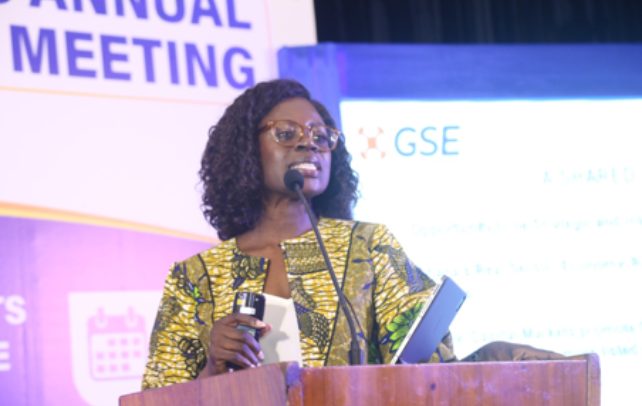Abena Amoah
CHIEF EXECUTIVE Officer (CEO) of the Ghana Stock Exchange (GSE), Abena Amoah, has advised pension scheme operators in the country not to over-concentrate on government securities, without considering other investment options.
According to her, inflation and concentration risk reduce pension scheme investment returns which often plunge them into significant market risks and reduced returns in the long run.
She made these remarks during the second Annual General Meeting (AGM) of the Health Sector Occupational Pension Scheme (HSOPS) in Accra themed, “Safeguarding the Achievements of Tier 2 Funds: A Collaborative Duty of Stakeholders,” highlighting Tier 2 pension schemes’ contribution to investment growth.
Explaining further, the GSE CEO indicated that inflation, for example, undermined the profits of pension schemes, resulting in inadequate compensation for pensioners adding that due to over-concentration on government securities, including bonds, pension funds were impacted by government decisions, particularly the Domestic Debt Exchange Programmes, which lowered their returns on investment.
She thus urged pension schemes to pursue real sector investments as well as ownership of Ghanaian resources such as interests in mining firms and investments in state-owned companies with strong financial performance in order to maximise returns.
Additionally, she also urged regulators to streamline regulations to allow pension schemes in Ghana to invest off-shore in regulated African and global markets and recommended the adoption of technology by pension schemes, saying it would “double” access pension products, innovate, and enhance financial literacy.
HSOPS AGM
The second AGM for HSOPS was attended by representatives of various health sector workers, including medical doctors, nurses, physician assistants, and pharmacists.
Presenting the financial report, Dr. Derek Boateng, Chairperson, Board of Trustees, said the scheme continued to record remarkable investment returns on a year-over-year basis.
He noted that for the year 2023, the scheme recorded a total gross investment income of ₵832 million compared to the ₵447 million recorded in 2022; adding that the net investment income of ₵830 million was also achieved during the year.
This, he explained, resulted in a significant increase in the gross return from 21.7 per cent in 2022 to 39 per cent in 2023.
BY Nii Adjei Mensahfio


